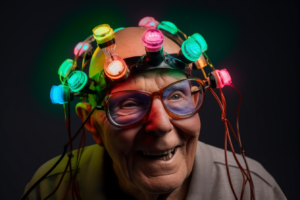Dementia Care 2.0: A Glimpse into the Future of Research, Breakthroughs, and Potentials

The future of dementia care is brimming with possibilities as advances in research pave the way for potential breakthroughs. There are some fascinating and promising developments in the field, that is sure to make the scientific journey exciting and entertaining!
Early Detection and Diagnosis:
Researchers are working tirelessly to develop new techniques for early detection and diagnosis of dementia. From innovative blood tests to sophisticated brain imaging, these advances could lead to earlier interventions and better outcomes. Just imagine, a world where your brain can be scanned as easily as your groceries at the supermarket checkout.
Personalized Medicine:
As our understanding of dementia grows, researchers are exploring personalized medicine approaches to target specific genes or biological pathways. With tailored treatments, we could potentially bid farewell to the one-size-fits-all mentality and enter a brave new world of customized care.
Non-pharmacological Interventions:
The power of non-pharmacological interventions, such as cognitive stimulation therapy, music therapy, and reminiscence therapy, is increasingly being recognized. RememberStuff fits seamlessly in this category and our technology improves rapidly and constantly. In addition to helping those with dementia, researchers use RememberStuff for their studies and data as well. These approaches offer hope for improving the quality of life for people with dementia without a prescription pad in sight.
Brain-Computer Interfaces:
Cutting-edge technology is making it possible to develop brain-computer interfaces that could potentially help people with dementia communicate or control their environment. The future may hold a world where telepathy isn’t just a sci-fi fantasy, but a tool for enhancing the lives of those living with dementia.
Lifestyle and Prevention:
Research continues to emphasize the importance of a healthy lifestyle in reducing the risk of dementia. As we learn more about the impact of diet, exercise, and mental stimulation, we can adopt strategies to keep our brains in tip-top shape (and maybe even justify that extra square of dark chocolate).
Artificial Intelligence and Robotics:
The integration of AI and robotics in dementia care holds exciting potential for improving the quality of life and independence of those living with dementia. From AI-driven diagnostic tools to robotic companions, the line between science fiction and reality is becoming increasingly blurred.
The future of dementia care is filled with promise as researchers and innovators work towards new breakthroughs and approaches. As we continue to learn, adapt, and push the boundaries of our understanding, we can look forward to a future where dementia care is more effective and personalized.
